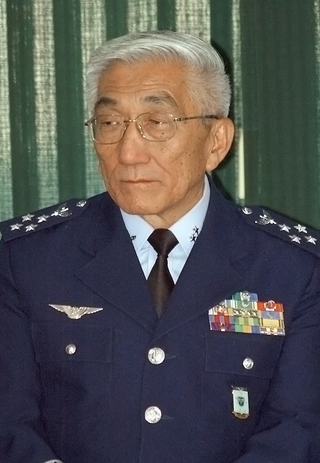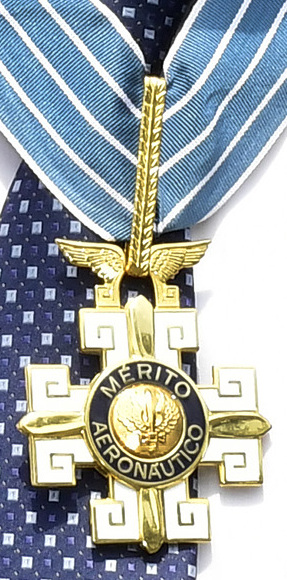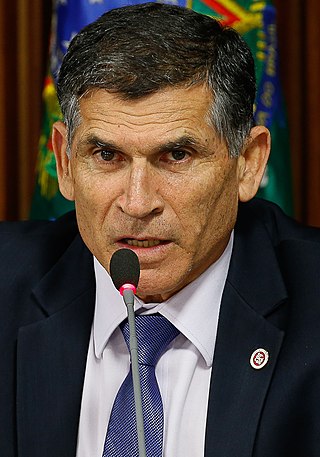
Augusto Hamann Rademaker Grünewald was a Brazilian admiral, of German and Danish descent, in the Brazilian Navy. Rademaker was one of the leaders of the Military Junta that ruled Brazil between the illness of Artur da Costa e Silva in August 1969 and the investiture ceremony of Emílio Garrastazu Médici in October of that same year, elected by fellow officer generals and confirmed by the Congress. In the same occasions Rademaker was picked and "elected" as vice president for the same term as Medici's (1969–1974).

Américo de Deus Rodrigues Tomás was a Portuguese Navy officer and politician who served as the 13th president of Portugal from 1958 to 1974. He was the last president of the authoritarian and corporatist Estado Novo.

The Military Order of Our Lord Jesus Christ is the former order of Knights Templar as it was reconstituted in Portugal. Before 1910, it was known as the Royal Military Order of Our Lord Jesus Christ, and the Order of the Knights of Our Lord Jesus Christ. It was founded in 1319, with the protection of King Denis of Portugal, after the Templars were abolished on 22 March 1312 by the papal bull, Vox in excelso, issued by Pope Clement V. King Denis refused to pursue and persecute the former knights as had occurred in most of the other sovereign states under the political influence of the Catholic Church.

Prince Gaston of Orleans, Count of Eu was a French prince and military commander who fought in the Hispano-Moroccan War and the Paraguayan War. He was the first son of Louis, Duke of Nemours and Princess Victoria of Saxe-Coburg and Gotha, and was married to Princess Isabel, daughter of Pedro II of Brazil and heiress to the Brazilian throne.

There were three Imperial Orders of the Mexican Empire, which were Orders of chivalry created to reward Heads of state and prominent people during the two periods of the Mexican Empire—the Imperial Order of Guadalupe, the Imperial Order of the Mexican Eagle, and the Imperial Order of Saint Charles.

The Ancient and Most Noble Military Order of the Tower and of the Sword, of the Valour, Loyalty and Merit, before 1910 Royal Military Order of the Tower and Sword, is a Portuguese order of knighthood and the pinnacle of the Portuguese honours system. It was created by King Afonso V in 1459. The order may be bestowed on people or on Portuguese municipalities.

The National Order of the Southern Cross is a Brazilian order of chivalry founded by Emperor Pedro I on 1 December 1822. The order aimed to commemorate the independence of Brazil and the coronation of Pedro I. The name derives from the geographical position of the country, under the constellation of the Southern Cross and also in memory of the name – Terra de Santa Cruz – given to Brazil following its first arrival by Europeans in 1500.

The Liberal Revolution of 1820 was a Portuguese political revolution that erupted in 1820. It began with a military insurrection in the city of Porto, in northern Portugal, that quickly and peacefully spread to the rest of the country. The Revolution resulted in the return in 1821 of the Portuguese court to Portugal from Brazil, where it had fled during the Peninsular War, and initiated a constitutional period in which the 1822 Constitution was ratified and implemented. The movement's liberal ideas had an important influence on Portuguese society and political organization in the nineteenth century.

Lieutenant-Brigadier Juniti Saito, is a military officer and was the commander of the Brazilian Air Force from 2007 to 2015.

The Order of Aeronautical Merit is an award of the Brazilian Air Force, established on 1 November 1943 by President Getúlio Vargas. The order is presented in five grades and recognizes distinguished service and exceptional contributions to the Brazilian Air Force.

The Order of Military Merit is an award of the Brazilian Army, established on 11 July 1934 by President Getúlio Vargas. The order is presented in five grades and recognizes distinguished service and exceptional contributions to Brazil by members the Brazilian Army and the armies of friendly nations.

The following is a list of the orders, decorations, and medals of Brazil:

Divisional general Carlos Alberto dos Santos Cruz is a Brazilian military officer who previously held the post of Force Commander of the United Nations' peacekeeping force in the Democratic Republic of the Congo. He was appointed to this position by United Nations Secretary-General Ban Ki-moon on 17 May 2013 and replaced by Derrick Mbuyiselo Mgwebi on 29 December 2015. He was Minister-Secretary of Government of Brazil, nominated by President Jair Bolsonaro, from 1 January 2019 to 13 June 2019.

The Order of Naval Merit is a Brazilian military decoration established on 4 July 1934 by president Getúlio Vargas.
Maria João Espírito Santo Bustorff SilvaGOM is a Portuguese restoration specialist, philanthropist and former politician. She is known for her historical and cultural restoration and preservation work in both Portugal and Brazil through the Ricardo Espírito Santo Foundation, and also for being Minister of Culture during the government of Prime Minister Pedro Santana Lopes.
The Order of Defence Merit is an award of the Brazilian Military, established on 10 June 2002 by decree No. 4263. The order is presented in five grades and recognizes distinguished service and exceptional contributions to Brazil by members of the Brazilian Military and the armies of friendly nations as well as civilians, and, less common, to organizations and institutions.

Luís Filipe de Castro Mendes is a Portuguese politician who served as Minister of Culture from 14 April 2016 to 15 October 2018. Mendes graduated from the University of Lisbon with a law degree. He served as the Portuguese ambassador to Budapest from 2003 to 2007, and as the ambassador to New Delhi from 2007 to 2009.

Luís Viana Filho was a Brazilian lawyer, professor, historian and politician who governed the state Bahia from 1967 to 1971.

Paulo Sérgio Nogueira de Oliveira is a Brazilian Army general who served as minister of defence of Brazil.

Carlos de Almeida Baptista Júnior is a Brazilian military, Lieutenant-Brigadier of the Air, and Commander of the Brazilian Air Force. Baptista Júnior became commander in April 2021, replacing Antonio Carlos Moretti Bermudez.


















